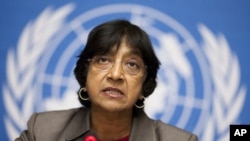The U.N. Human Rights Council has strongly condemned “the continued widespread, systematic and gross violations of human rights” in Syria where the government is entering its ninth month of a bloody crackdown on dissenters.
|
A Look At Syria's Main Opposition Groups
|
During an emergency session convened Friday in Geneva, the U.N. rights body overwhelmingly adopted a resolution that will establish a special investigator to probe human rights abuses in Syria.
U.N. High Commissioner for Human Rights, Navi Pillay, told the Human Rights Council’s 47 member states that more than 4,000 people have been killed since the crackdown began in mid-March, including 307 children. She said tens of thousands of people have been arrested and some 14,000 remain in Syrian jails.
Earlier this week, the U.N. Human Rights Council’s Independent International Commission of Inquiry delivered its initial report, which concluded that Syria's security and military forces have committed crimes against humanity. Pillay urged the U.N. Security Council to refer the matter to the International Criminal Court at The Hague and said the international community needs to urgently act to protect the Syrian people.
“The Syrian authorities’ continual ruthless repression, if not stopped now, can drive the country into a full-fledged civil war," said Pillay. "In light of the manifest failure of the Syrian authorities to protect their citizens, the international community needs to take urgent and effective measures to protect the Syrian people.”
In a vote of 37 in favor, four against and six abstentions, the Human Rights Council strongly condemned the violence and established a special rapporteur to investigate the situation of human rights in Syria.
Russia, China, Ecuador and Cuba were the four members who voted against the measure, while all four of the Human Rights Council’s Arab members were among the states supporting the resolution.
The resolution stops short of explicitly referring the commission’s report on Syria to the U.N. Security Council -- which could then refer the matter to the International Criminal Court -- but it does charge the U.N. Secretary-General with taking “appropriate action” and transmitting the report to “all U.N. relevant bodies” which could include the General Assembly or Security Council.
Speaking before the vote, Syria’s envoy in Geneva, Faysal Khabbaz Hamwi, dismissed the draft resolution as “one-sided” and “biased.” He urged members not to vote for it, saying it would not help the Syrian people.
“In addition to the false message they are addressing to the situation in my country, we would have hoped to have a more balanced draft resolution that would call on ceasing all forms of armed violence in my country," said a translator on Hamwi's behalf. "We would have liked the draft resolution to call on all sections of the Syrian people to start an effective, real national dialogue to put an end to the crisis. Nevertheless, it did not refer to that whatsoever.”
As the death toll continues to climb, international pressure on Syria has been intensifying, with the European Union, the United States and the Arab League all separately sanctioning the regime of President Bashar al-Assad.




